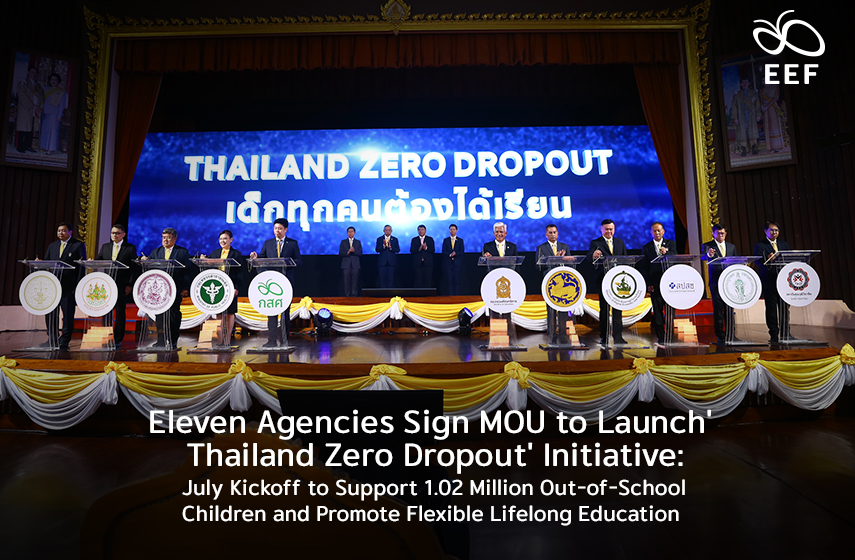
On 28 June 2024, at the Khurusapha Conference Room, Ministry of Education, eleven agencies, including the Ministry of Interior, Ministry of Education, Ministry of Digital Economy and Society, Ministry of Social Development and Human Security, Ministry of Public Health, Ministry of Labour, Ministry of Justice, Bangkok Metropolitan Administration, the National Health Security Office, Thailand Professional Qualification Institute (Public Organization), and the Equitable Education Fund (EEF) Thailand, signed a memorandum of understanding for cooperation. This initiative aims to address the issue of children and youth outside the education system, facilitating their return to school or providing tailored learning support under the “Thailand Zero Dropout” initiative. Police General Permpoon Chidchob, Minister of Education, represented the government in announcing the cooperation of all eleven agencies.
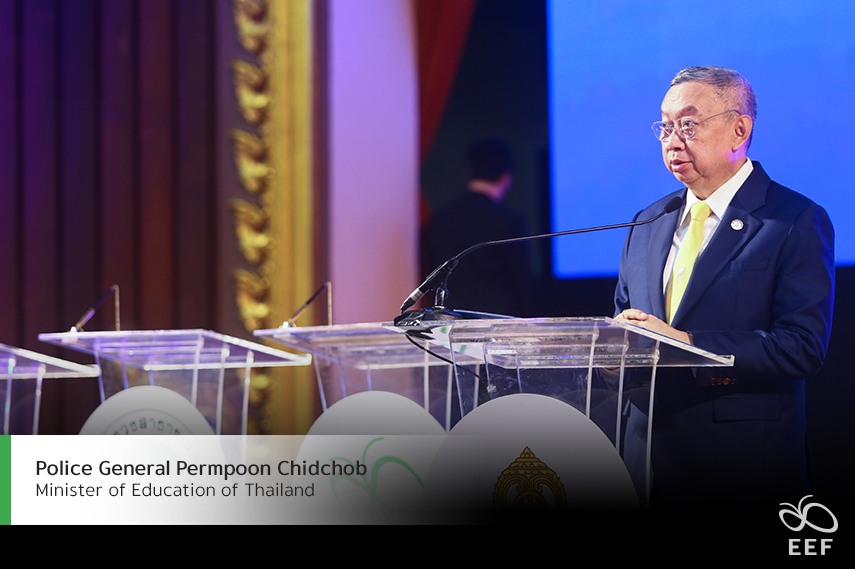
Police General Permpoon Chidchob, Minister of Education of Thailand
Police General Permpoon Chidchob, Minister of Education of Thailand, stated that the cooperative effort of these agencies marks a significant milestone in Thai education history. Addressing the challenge of children and youth outside the education system has been designated a national priority by the government. The success of the ‘Thailand Zero Dropout’ initiative hinges on the integrated cooperation of all involved agencies to achieve practical and impactful outcomes. The signing ceremony for the memorandum of understanding symbolizes the beginning of a crucial phase in tracking and assisting children and youth who have dropped out of the education system, which aligns with the government’s “Thailand Zero Dropout” goal.
The Police General further explained that following Prime Minister Srettha Thavisin’s directive, the Ministry of Education, Ministry of Interior, Ministry of Digital Economy and Society, and the Equitable Education Fund were tasked with integrating individual databases of children and youth aged 3-18 across 21 educational management agencies nationwide with the civil registration database of the Ministry of Interior. This integration revealed that in the academic year 2023, 1,025,514 children and youth within this age range were not registered in any of the 21 agency education systems.

He emphasized that by leveraging this database, the government has urged all relevant agencies to collaborate in locating, tracking, and supporting children and youth outside the education system. The objective is to ensure their return to school or provide personalized learning support and development opportunities. Commencing in July 2024, every province will initiate efforts to locate and assist such individuals nationwide. The “Thai Zero Dropout” application supports these efforts. It is designed to facilitate surveys, develop individualized care plans, provide assistance connections, make referrals at local and national levels, and monitor progress.
“Investing in children’s education is invaluable as they are our most precious resources. Regardless of the financial investment required, ensuring their education is paramount. We firmly believe that rescuing even one child justifies our efforts, far outweighing the consequences of leaving them without education. We are committed to leaving no one behind, dedicating whatever resources are necessary to ensure everyone can access education. From now on, every child and youth outside the education system will be on the government’s radar,” said Police General Permpoon Chidchob.
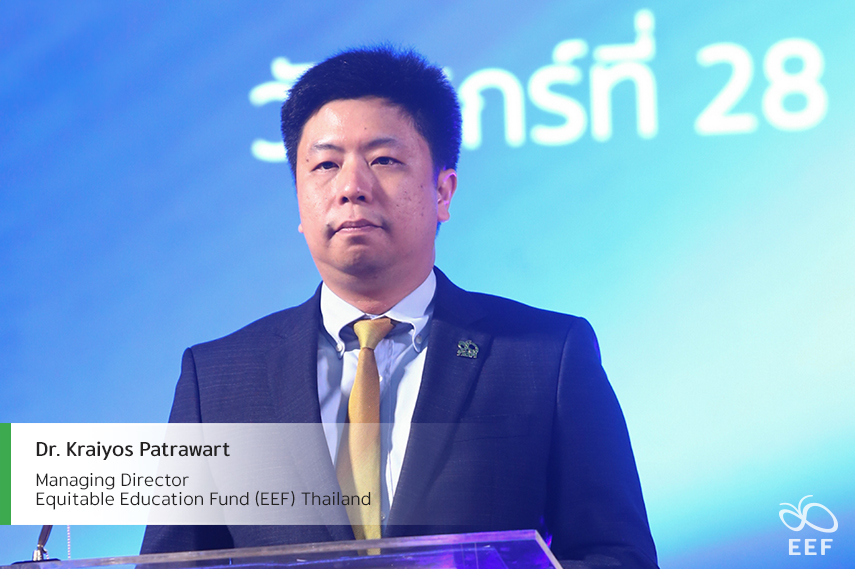
Dr. Kraiyos Patrawart, Managing Director, Equitable Education Fund (EEF) Thailand
Dr. Kraiyos Patrawart, Managing Director at the Equitable Education Fund (EEF) Thailand, highlighted that this MOU signifies a strong social commitment, demonstrating unified efforts among the government and all stakeholders to ensure educational opportunities for all Thai children and youth. The initiative follows a structured five-step approach. Step 1 involves surveying dropout data to continuously develop an individual and area-specific database of children and youth outside the education system. Step 2 focuses on providing personalized assistance to dropout children through a collaborative network of multidisciplinary professionals. Step 3 aims to facilitate the return of children and youth to flexible learning environments that cater to their choices and needs, leveraging various educational innovations. Step 4 ensures ongoing support through educational partnerships under the “All for Education” concept, including local learning networks and mobilization of resources for community-based learning. Step 5 aims to empower these children and youth to become pivotal contributors to the country’s future, driving economic and social growth.
“The issue of over 1 million children and youth dropping out of the education system has resulted in significant economic losses and increased inequality in Thailand. By reintegrating these children into education, the Gross Domestic Product (GDP) could increase by up to 1.7% annually. Therefore, achieving success in this initiative will lead to substantial positive economic and social transformations.” noted Dr. Patrawart.
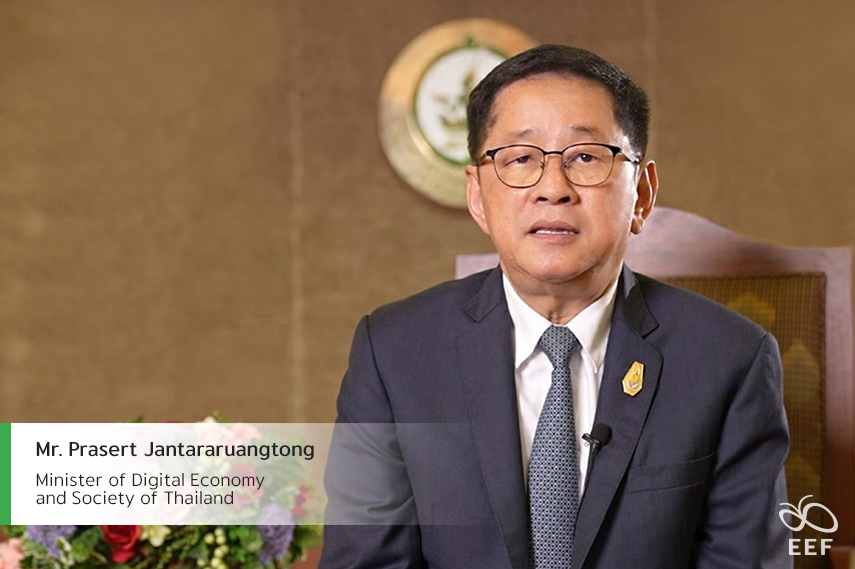
Mr. Prasert Jantararuangtong, Minister of Digital Economy and Society of Thailand
Mr. Prasert Jantararuangtong, Minister of Digital Economy and Society, affirmed that the Ministry of Digital Economy will take the lead in annually integrating and consolidating data on children and youth outside the education system. This initiative aims to enable both central and local agencies to proactively monitor and support students before each school semester, aiming to eliminate this issue.
Furthermore, the ministry plans to deploy Big Data Analytics to forecast the risk of children and youth dropping out of school. This involves integrating databases from various ministries concerning parents or guardians assessing their capacity to support their children. By categorizing children into different risk levels for dropout, relevant agencies can offer timely interventions and support.
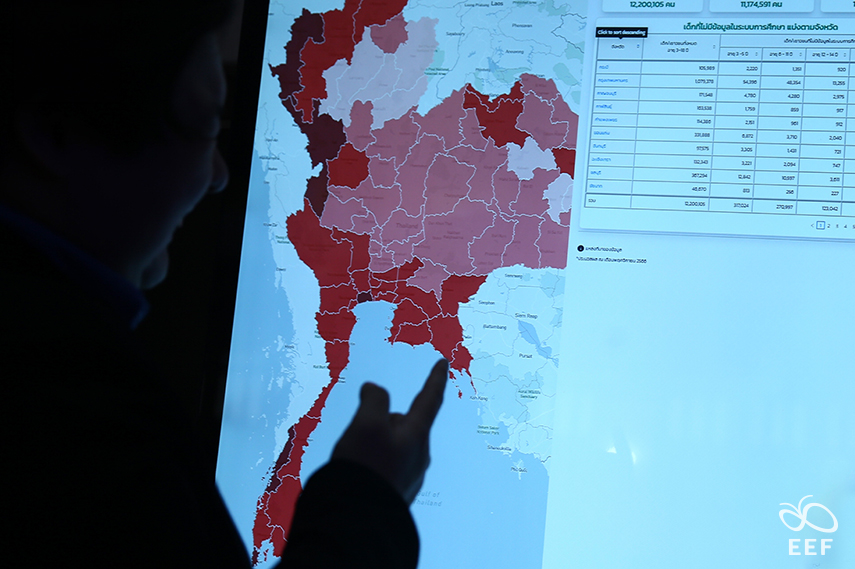
On 28 May 2024, the Cabinet acknowledged the facts mentioned above and approved measures to bolster Thailand’s efforts in addressing the issue of children and youth outside the education system, aiming for zero dropouts through the “Thailand Zero Dropout” initiative. These measures include: 1) Identifying children and youth outside the education system by integrating and linking data from relevant agencies. 2) Tracking, assisting, referring, and providing care for children and youth through coordinated efforts across various agencies. 3) Offering flexible, high-quality education and learning opportunities tailored to the potential of each child and youth. And lastly, 4) Encouraging participation from private sector entrepreneurs in providing educational and learning opportunities.

